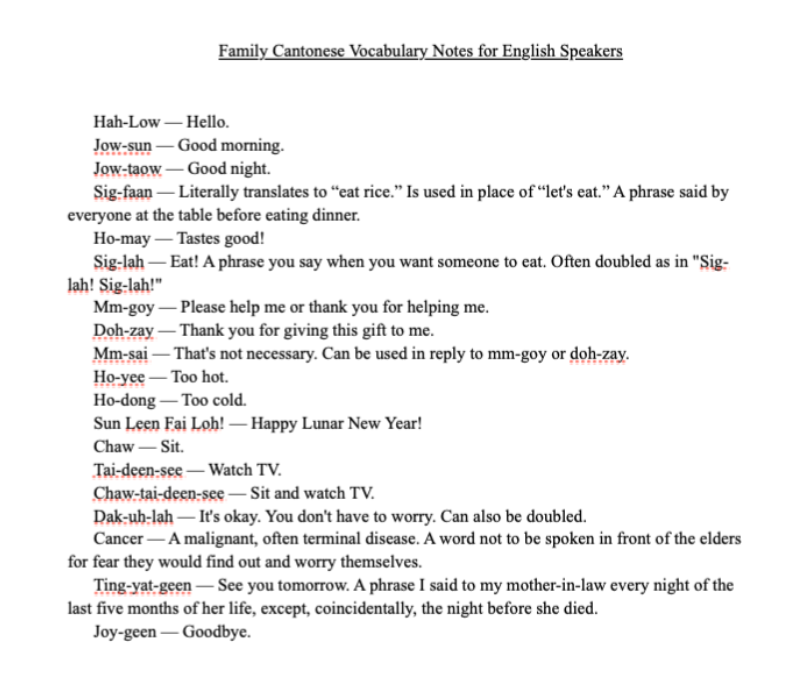Finding the Form with Danica Longair
By Danica Longair
“What is grief, if not love persevering?” – WandaVision
Cancer is the same in both languages. At least, in my family of Hong Kong immigrants, who speak a mixture of Cantonese and English when they talk to each other. I don’t know how they
decide, subconsciously and on the spot, which words to say in each language, but it seemed to me that there was no Cantonese word for cancer, and that fascinated me.
I first started my piece, “Cantonese Lessons for a Foreign Daughter-in-Law,” in 2018 while I was still trying to learn my husband’s native language, phrase by phrase. I had also recently taken classes with Creative Nonfiction expert Nicole Breit and learned about the hermit crab essay form. Such an essay takes the form of an everyday document as a shell, like a hermit crab, for the more vulnerable creative writing of a piece. Rowan McCandless is a master of this form, and it can be read in her book Persephone’s Children. The life I was living was one of healing from the prolonged trauma of caring for my mother-in-law in her final months of life. It was an honour to do so and to be so close to her as her life ended, but it was certainly a vulnerable time to write about. Thus, the hermit crab essay seemed the right form and what better form to take than a vocabulary list.

This is an early draft, which I actually entered in some contests. In it, I list some of the phrases I learned. I am terrible at second languages. Absolutely atrocious. So, I would write down the words the way I heard them and memorize the tones.
Because the years have gone by, I cannot remember the exact impetus to expand the piecefrom here. Initially, I wrote a longer draft that was nonlinear. For each Cantonese phrase, I wrote it out the way I heard it, defined it with the meaning I understood, and then gave one or more examples of the phrase from my own life and perspective. I was lucky to have the opportunity to get some editing feedback on the piece from author Doretta Lau. She offered many excellent suggestions, and it was she who convinced me to re-form the piece to be linear. While I am a fan of nonlinear structures that give readers the info they need in the order they need it, rather than technically in the order I lived it, Doretta was right that using both the hermit crab and nonlinear structures was making the experience confusing. Add the various unnamed characters and the reader will likely get lost.
Doretta also helped me with the correct spelling and definitions of Cantonese words. I aim to write in a decolonial way, and this was an important step towards that. In the essay, my greatest aim was to honour my mother-in-law, who was born on colonized land and living under settler rule. She was kind and wonderful, and before her cancer diagnosis, a happy woman. Her cancer changed her dramatically. We lost her long before we had to say goodbye. I loved her dearly and, having experienced loss, know that I am privileged, as a writer, to be able to write about my loved ones so that they live on. In some library, hundreds of years from now, this issue of The New Quarterly will hopefully exist. My artifacts will be my afterlife, and hers.
I struggled with how to write about my relatives, living and gone beyond. Shared trauma brings out all sorts of emotions, many ugly. I was careful to write in a way that both honoured the truth of my experience and also in a way that would do no harm. I wrote about times when my mother-in-law was vulnerable, confiding in me, or experiencing things she likely would not have shared in life. It took a long time for me to decide that she would ultimately support the truth, the compassion in the piece, and the empathy I aimed to provoke in the reader. I wrote a lot about what it would be like to live with cancer around that time and was careful to use my own empathy to show people living with cancer that I saw them. I see what it’s truly like.
Now that this piece is published, I return to the vulnerable feelings the experiences evoked. I am closing this chapter of non-fiction writing in favour of fiction. I have yet to have any of my fiction published. My current focus is on a novel about mental illness and intergenerational trauma. It shows my characters’ past, present, and dystopic future, in a nonlinear format. My writing, no matter the genre, will always aim to show truth.

Danica Longair is a mother, writer, and disabled, white settler grateful to be living on the unceded territories of the Musqueam, Squamish, and Tsleil-Waututh peoples. She usually can be found planted on her velvety couch trying to sip lukewarm tea while her kids and cat crawl on her. Please visit www.danicalongair.com for her occasional writerly adventures.
Photo Courtesy of iStock Getty Images

